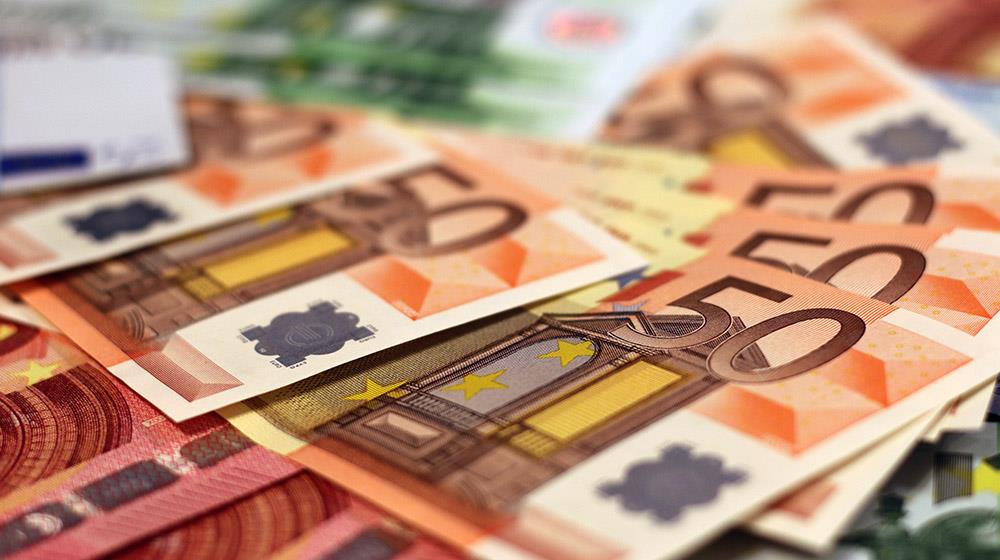The bicommunal Technical Committee on economic and commercial matters is examining ways to withdraw damaged euro banknotes that have been accumulated in the occupied territories of the Republic of Cyprus through the Central Bank.
This was noted by Greek Cypriot Co-Chairman of the Committee, Manthos Mavrommatis, in statements to CNA. Significant quantities of such damaged euro notes have been accumulated, he said, noting that the Committee is looking for a legal, easy and practical way to withdraw them.
Mavrommatis also told CNA that the bicommunal Technical Committee is also considering the possibility of involving Greek Cypriot and Turkish Cypriot companies in the planned solar park in the Buffer Zone promoted by the European Commission, as well as the recycling of waste electrical appliances from the occupied territories.
Additionally, the Technical Committee aims to contribute "to the development of trade across the Green Line and the potential business synergies that may result from it, as well as any other measures that bring the two business communities of the country closer together", he said.
The trade across the Green Line is regulated by the Green Line Regulation. The EU, which Cyprus joined in May 2004, in an effort to contribute to closer ties between the island’s two communities, adopted in 2004 the Green Line Regulation which defines the legal framework on the crossing of goods, persons and services to and from the island’s northern Turkish occupied areas.
The biggest challenge before the Committee, and one on which it has spent a great deal of time, "is an attempt for the Central Bank of Cyprus to exchange the damaged euro notes held in the Turkish Cypriot community", he said.
After so many years, significant quantities of such damaged euro notes have been accumulated and "we are trying to find the legal but easy and practical way to make this exchange through the Central Bank of Cyprus", Mavrommatis said.
"I want to be optimistic that in the near future we will have positive developments" on the subject, he said.
Regarding the issue of waste electrical and electronic equipment in the Turkish Cypriot community, the Co-Chairman of the Technical Committee said that in the past the Committee had put forward a proposal for their collection and recycling and for their transportation and processing in recycling plants in the Greek Cypriot community. As he explained, there is no such system in place in the Turkish Cypriot community. "We consider this to be something to the benefit of both communities, which also contributes to the preservation of the environment from any bad effects due to the abandoned equipment in various places and especially along the Green Line", he stressed.
In the future, the Technical Committee is interested in the discussion on the creation of a solar park in the Buffer Zone, because "there is certainly the business side of the whole project and we would very much like to see if Greek Cypriot or Turkish Cypriot companies can contribute to the implementation of such a project, which is certainly in line with the priorities of the European Union" and which will certainly help the whole island, Mavrommatis said.
Regarding the various problems regarding trade as per the Green Line Regulation, he said that they are being addressed mainly at the level of the two chambers, the Cyprus Chamber of Commerce and Industry and the Turkish Cypriot Chamber of Commerce, noting that these are also being examined by the Committee.
"There are various initiatives underway by the special office set up by the European Commission in Cyprus to assist both in matters of payments through bank transfers, so that Green Line trade does not have to be done in cash, which is essentially what is done today, as well as in the digitisation of the relevant accompanying documents required by the two chambers, which will greatly assist all Cypriots involved in Green Line trade, not to have to go to their own chambers of commerce", he said. If "everything can be done online, that is a great help in this era", he added.
On issues regarding the banking system, he said that the Committee is in constant contact with both the Association of Cyprus Banks and the Central Bank, noting that while Turkish Cypriots as individuals are allowed to open basic accounts in Greek Cypriot banks, "we want to look at how this can be extended to companies so that the Green Line trade can be benefited".
He noted, however, that these are "difficult issues" as the banks are commercials, and "no one can order them because these acts are considered 'dangerous' and there is a reluctance, but we continue to monitor the issue and encourage efforts".
Finally, Mavrommatis noted that currently there is a pilot exchange programme for internships for young students in companies in the other community, either commercial companies, service companies or research institutions. "Our aim is to expand this programme because we consider it important", he said.
(Source: CNA)









